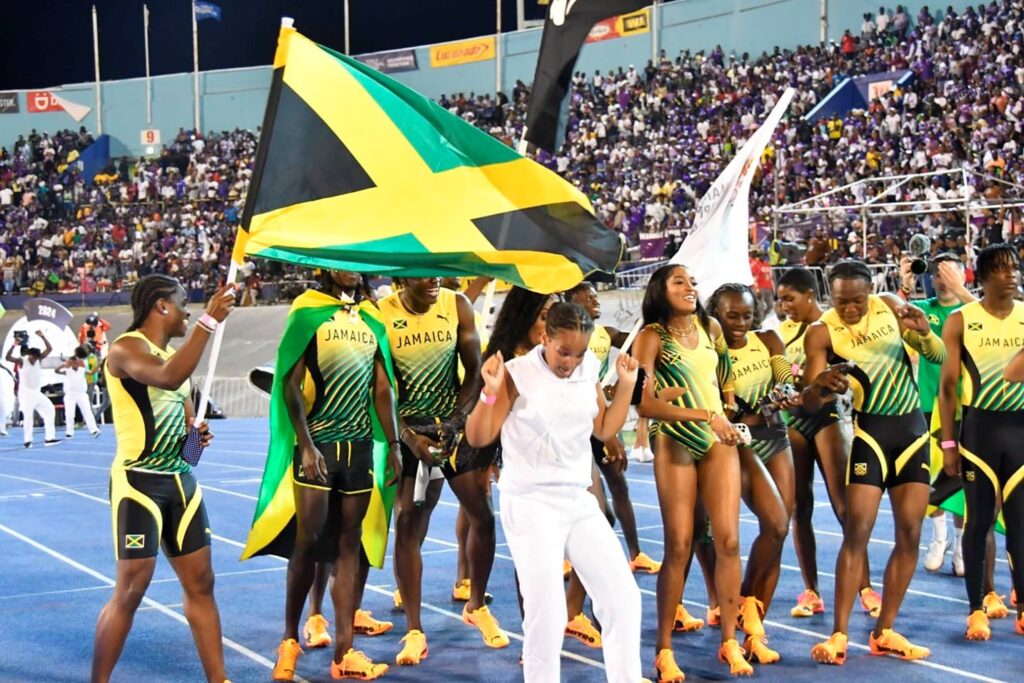Team Jamaica model their new Puma gear for the Paris Olympic Games at the ISSA/GraceKennedy Boys’ and Girls’ Athletics Championships in March. (Photo: Garfield Robinson)
JAMAICA Olympic Association President Christopher Samuda has warned the public not to lose sight of the Olympic spirit in light of the threat posed by artificial intelligence (AI) towards cybersecurity and information during the Paris Games.
With the Games now just 11 days away, attention turns to the French capital regarding the athletic prowess of each Olympian and the city’s ability to host without any major security concerns.
Political tension around the globe, including a recent legislative election in France, wars in Ukraine and Gaza; and an assassination attempt on United States presidential candidate Donald Trump at the weekend have increased fears of politically motivated violence at high-profile global events.
“There will always be security concerns when delivering mass events — and the Olympic Games is not immune,” Samuda told the Jamaica Observer.
Nation states are using AI-generated deepfakes, social media bots, and fake news websites to spread misinformation about the Paris Games. A deepfake is a video of a person or persons whose faces or bodies have been digitally altered to misrepresent others.
The aim is to incite fear among civilians and tourists, damage France’s reputation, and potentially incite social unrest.
Misinformation can lead to confusion, anxiety, and financial losses for travellers. It can also damage France’s tourism industry and erode public trust.
“Motivated by financial gain, cybercriminals are redoubling their efforts and will not hesitate to create websites that spoof everyday services such as web-based email, online shopping, banks, and government agencies,” the Paris Games’ official website says.
Experts have warned that a misinformation campaign through AI has already begun, targeting the Olympics.
Russian disinformation group Storm 1679 used Telegram, an instant messaging app, in June 2023 to release a feature-length, deepfake film called Olympics Has Fallen.
Olympics Has Fallen mimics the 2013 feature film Olympus Has Fallen and uses pro-Kremlin-driven propaganda targeted at International Olympic Committee (IOC). The film features an AI-generated recreation of actor Tom Cruise, who took no part in the project nor gave consent to the use of his likeness.
National security and human rights lawyer and journalist Irina Tsukerman said in an article on Techopedia that the effect of these campaigns is more observable in the long term.
“The average person will not stop watching the Olympics just because some account online said something,” she said, “but more sophisticated campaigns that are more subtle can be quite effective by raising questions, and doubts.
“Furthermore, more sophisticated techniques such as deepfakes and voice cloning could have a more immediate impact if the narrative is realistic. With the rise of the far-right in Europe and in France these types of stories and angles are likely to gain social impact.”
Microsoft Threat Analysis Centre General Manager Clint Watts blogged that such AI-generated operations have two main aims. The first, he says, is to denigrate the reputation of IOC, and the other is to create the expectation of violence breaking out in Paris at the Games.
“Russia is ramping up malign disinformation campaigns against France, French President Emmanuel Macron, the IOC, and this summer’s Olympic Games in Paris,” he said. “While Russia has a decades-long history of targeting the Olympic Games, the Microsoft Threat Analysis Center has observed old tactics blending with AI in malign activity that may intensify as the 2024 Paris Opening Ceremony approaches.”
Insurers are another set of stakeholders concerned about AI-generated cyber attacks at the Games. Their concerns regard attacks resulting in the cancellation of events and dealing with millions of dollars in claims. Their fears are not baseless as this was an issue recently, with the Tokyo 2020 Games being delayed by a year because of the COVID-19 pandemic.
“Insurance providers will sensibly look with a third eye for risks which may result from attacks and AI-generated images which may mislead the viewing public,” Samuda said. “Perhaps a fourth eye will be needed to ensure AI doesn’t invade media coverage of events.
“But these eyes, while keeping watch, must not let us lose our vision of the Olympic Games which unites a global citizenry of multifaceted cultures, races, religious creeds, and political beliefs across oceans and continents to celebrate the prowess and excellence of the human spirit and will — which AI cannot defy. AI is an enabler for us to understand the psychology, mechanics, analytics, and kinetics of sport better but we must never permit it to imprison the body of sport.”
But Samuda says care must be exercised regarding the narrative around AI and cybersecurity because fear-mongering could affect athletes.
“We, however, do a disservice to the Games and athletes’ dreams and aspirations if we panic and overreact, creating unease for one’s own purpose when there is no basis,” he said. “We must be fair-minded and not fear-stricken.
“The JOA continues to reinforce protocols and alerts that will educate, as best as possible, members as to the pitfalls of AI.”
The Olympic Games start on Friday, July 26 with an opening ceremony on the River Seine and ends on Sunday, August 11. The Paralympic Games take place in the same city from Wedmesday, August 28 to Sunday, September 8.
